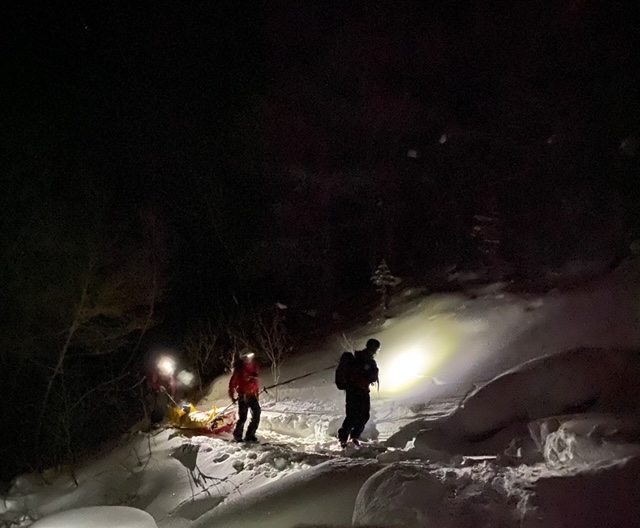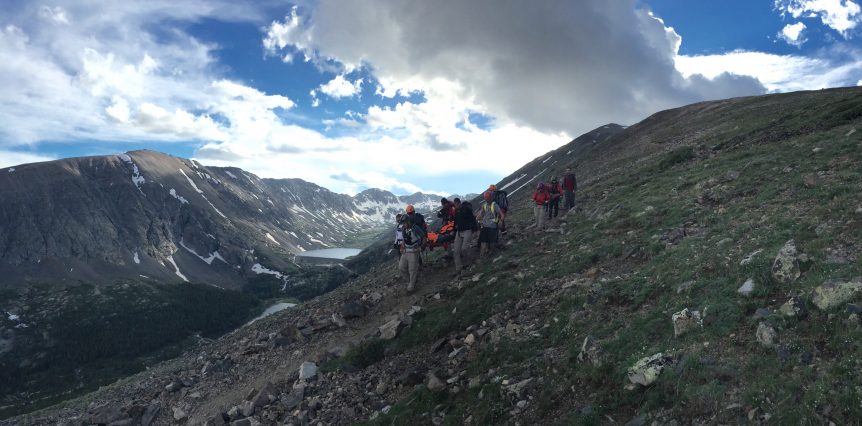The British Columbia Search and Rescue Association tells the story of a snowmobiler with severe injuries who, rather than calling 911, asked his friends to evacuate him to a nearby mountain cabin. From there, they rigged a sled out of a plywood slab and dragged him down the mountain the long and hard way. By the time he reached the hospital he had lost so much blood his leg had to be amputated. This might have been avoided if a backcountry search and rescue team’s resources and expertise had been applied to the problem. This same situation occurs all too often across the mountain west of the United States.
Volunteer SAR responders are often asked why they don’t charge. Backcountry SAR responders in Colorado not only give thousands of hours of their time collectively, but often pay thousands of dollars each year out of pocket for backcountry gear, transportation, training, and other expenses. Rescuers also give their time to fundraise for operational expenses, administer their teams, and provide public safety education. So why not charge?
The State of Colorado has declared that backcountry search and rescue is an essential service in Colorado. The Colorado SAR community believes SAR is a service that should be provided to anyone, regardless of ability to pay. These civic minded volunteers do what they do for many different reasons, including simple humanitarian support for their neighbors and visitors. They enjoy being outdoors, and many of them talk about the personal pride that comes from working as a team to save lives. SAR teams, in many ways, help sustain the Colorado way of life. Charging for services, especially in a punitive context, does nothing to further this culture and likely would injure Colorado outdoor tourism.
Not charging for SAR is a traditional practice worldwide and conforms with international agreements and the United States National Search and Rescue Plan. Many Colorado SAR teams are members of the Mountain Rescue Association (MRA) and there is a strong tradition within the MRA to not charge for SAR. The National Association for Search and Rescue (NASAR) takes the position, “To eliminate the fear of being unable to pay for having one’s life saved, SAR services should be rendered to persons in danger or distress without subsequent cost-recovery from the person(s) assisted unless prior arrangements have been made. The mission of SAR organizations is to save lives, not just the lives of those who can afford to pay the bill.”
Law enforcement organizations don’t charge when a child goes missing in a city. The Coast Guard doesn’t charge when they respond to a boat accident. FEMA doesn’t charge when a building collapses. Why should backcountry search and rescue be any different?
It’s true that teams are often over-taxed, especially now, when Covid is driving increasing numbers of recreationists into the backcountry. Often newcomers to the backcountry call 911 in questionable circumstances. It’s also true that here in Colorado, we have advocated for a more sustainable system that includes mental health and financial support for volunteers in order to meet increasing mission load. Yet we still don’t believe charging for services is the answer. We know from experience that when people think they’re going to be charged, they often delay calling or even intentionally evade rescuers. A rescue that might have been accomplished on a sunny afternoon and had rescuers home in time for dinner perhaps now has them getting out of bed at 3:00 am in bad weather. This can make the incident more dangerous for the subjects as well as the rescuers; injuries worsen, hypothermia sets in, cell phone batteries die, subjects become disoriented. In some cases, what could have been a live rescue becomes a body recovery.

The Summit County Rescue Group tells the story of a young hiker who became stranded on Colorado’s 14,270 foot Quandary Peak. She called 911, but asked the SAR coordinator just to “talk her out of the area,” which was a dangerous, technical part of the mountain. The sun had already set and it was getting cold, but she repeatedly insisted the team should not come to help her. The SAR coordinator finally asked why she didn’t want help, and she replied, “I can’t afford it.” He explained there would be no charge and she finally relented.
You can read many more cases in which rescue subjects delayed calling or expressed fear of being charged here.
There are a few caveats to the “no charge for rescue” doctrine. First, if you are rescued by a backcountry SAR team, they may call in other resources that do commonly charge for services, such as ambulances and medivac helicopters. Health insurance plans may offer coverage for these kinds of medical transport.
Second, SAR teams do sometimes enter into financial agreements with organizations to provide event-related support, such as when they provide medical aid stations at race events or public gatherings, or during a state or federally declared disaster. These arrangements are mutually agreed upon in advance.
Third, most SAR teams fund their operational needs through donations and grants and will gratefully accept voluntary donations from rescued subjects. CSAR encourages rescued subjects to consider donating if they can.
Lastly, CSAR and our member teams do not take a position regarding law enforcement officials issuing a criminal citation or seeking damages, regardless of whether that individual receives SAR services as a result of breaking the law.
What about the Colorado SAR Fund that is funded through CORSAR cards and hunting, fishing and OHV licenses? Many outdoor recreationists are aware these cards provide money to search and rescue teams, but often they are under the misconception that this is rescue insurance. In fact, when you buy one of these a portion of the fee goes into a fund administered by Colorado Parks and Wildlife (CPW). Sheriffs can then apply to be reimbursed for costs associated with a SAR incident or, if money is available at the end of each year, to assist SAR teams with training and equipment. If you don’t already have a hunting, fishing or OHV license, buying a CORSAR card is a good thing to do and helps support rescue teams. But it isn’t insurance, and it doesn’t provide nearly enough funding to cover all the costs associated with SAR. You don’t need to pay into the SAR Fund to receive SAR services. SAR teams will be there for anyone in need, so don’t delay calling 911 if you need our help; your life may depend on it.

